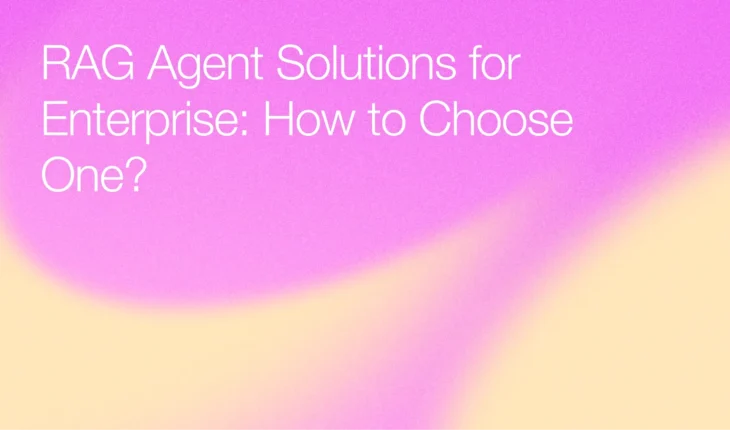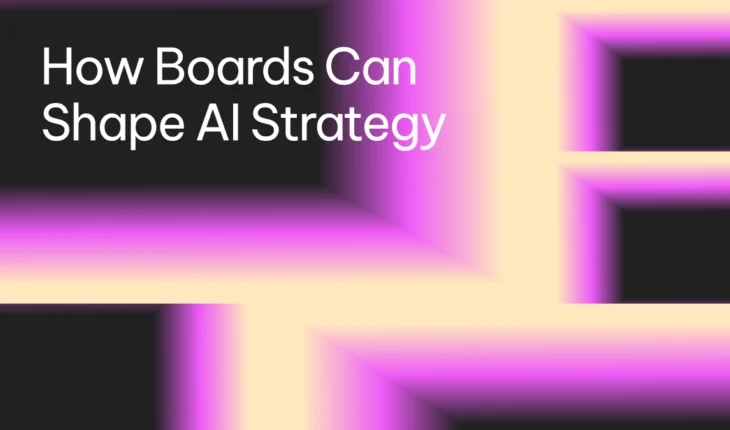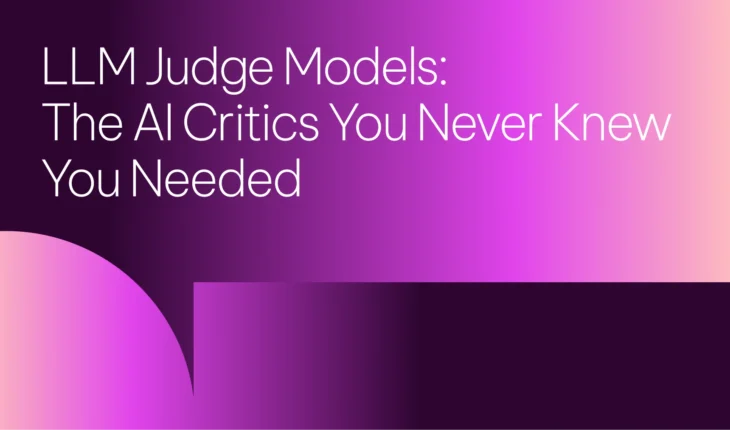Table of Contents
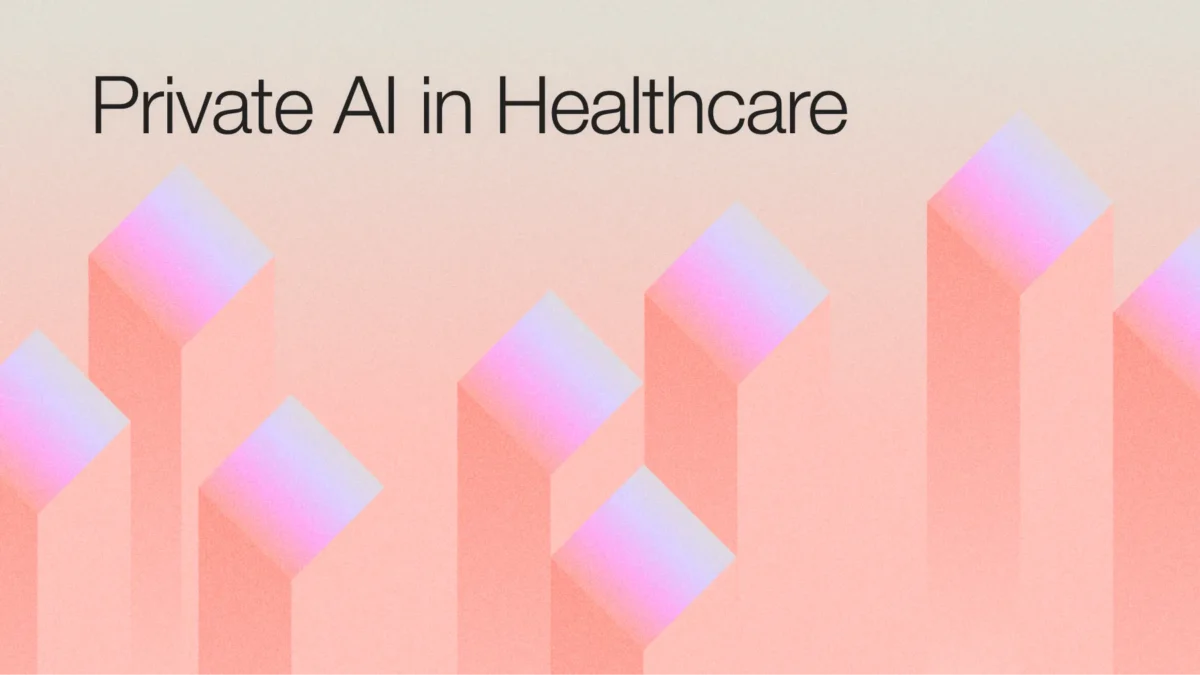
Private AI in Healthcare: Applications, Examples & Deployment
More than 90% of healthcare organizations have experienced at least one data breach in recent years, according to HIPAA. For an industry built on trust and privacy, this presents a significant obstacle to digital innovation.
Yet despite the rise of AI solutions that could reduce admin burdens and actively improve patient outcomes, many healthcare leaders remain cautious. This is sensible, given the penalties for violating patient data leave little room for error.
Private AI offers a solution: artificial intelligence that’s deployed within a healthcare provider’s secure infrastructure, designed to meet strict privacy regulations while still enabling innovation.
In this article, we’ll examine how private AI supports safe, scalable AI adoption across healthcare, from clinical decision-making and patient communication to medical records and back-office operations, and how to implement it.
What is private AI in healthcare?
Private AI in healthcare refers to artificial intelligence systems hosted within an organisation’s internal infrastructure to protect sensitive patient data.
This ensures data remains within the organisation, supporting compliance with HIPAA, GDPR, and other regulatory frameworks.
Private AI allows healthcare teams to safely use AI models, such as large language models, for analyzing electronic health records and generating clinical insights. It also supports automated detection and redaction of identifying information, reducing the risk of data exposure.
Applications for private AI in healthcare
Private AI is a powerful approach for healthcare organizations seeking to strike a balance between innovation and privacy. By maintaining complete control over both data and models, private AI enables safe and compliant deployment of AI.
Here are just a few areas where private AI is best suited:
Patient Information
Private AI ensures that sensitive data never leaves the healthcare provider’s internal infrastructure. It also allows for strict control over how data is shared internally, meeting even the highest compliance standards and reducing exposure to third-party risks.
With Private AI, healthcare organizations can automatically identify and de-identify sensitive patient data, removing all 18 HIPAA identifiers from sources such as electronic health records (EHRs), clinical notes, and audio transcripts. High-accuracy redaction enables raw data to be converted into HIPAA-compliant formats that can be safely used for machine learning and advanced analytics.
For example, hospitals can use federated learning to collaboratively train AI models for disease detection without sharing patient records. Each organization trains the model locally and contributes encrypted updates, keeping patient data secure at all times.
Patient Relations
Private AI supports secure, automated patient communications while ensuring full data control. It enables healthcare providers to deliver AI-powered interactions, such as chatbots, triage tools, and appointment reminders, without sending data to external servers.
Organizations can create controlled-access personas that run AI models within private containers or virtual private clouds (VPCs). This setup supports experimentation on anonymized or synthetic data without exposing real patient information.
It also enables pharmaceutical companies to accelerate clinical trials by aggregating data across institutions using secure multiparty computation (SMPC) or homomorphic encryption. These methods allow analysis across encrypted datasets, preserving privacy while accelerating outcomes.
In addition, AI tools can support patient education by providing 24/7 access to information on eligibility, billing, services, and care instructions, helping improve satisfaction and engagement.
Clinical decision support
Private AI enables more informed, faster clinical decisions by safely processing sensitive medical data to train and run AI models.
For example, a provider can use a large language model (LLM) within a secure environment to summarize medical notes, retrieve relevant patient history, or suggest diagnostic pathways. This improves care quality while keeping data under organizational control.
Private AI can also power clinical text analysis, medical question-answering systems, and predictive models, all while maintaining full compliance with HIPAA and other healthcare data regulations.
Administrative assistance
Americans have among the lowest rates of practicing physicians and hospital beds per 1,000 population. Time is scarce. Private AI enhances operational efficiency by automating administrative tasks without compromising privacy. From billing and account resolution to documentation and scheduling, as well as handling healthcare policies, many routine functions can be streamlined using secure AI models.
For example, AI can generate real-time payment estimates, offer cost transparency, and assist with insurance verification, giving patients better visibility while reducing staff workload.
Documentation tools can also summarize clinician notes, assist with onboarding, and automate form generation, all within the organization’s infrastructure and complying with HIPAA.
Additionally, documentation tools streamline medical note summarisation, saving clinicians time on tasks like scheduling and onboarding, without sending data to external servers.
Real-world examples of private AI use in healthcare
Private AI is already being adopted across the healthcare sector to meet the dual demands of innovation and data privacy. As AI increasingly integrates into clinical and operational workflows, real-world use cases show how private deployments can deliver measurable benefits without compromising sensitive information.
Accolade, a U.S.-based provider of personalized primary care and mental health support, has deployed private AI. The organization required a digital customer service assistant powered by generative AI to provide always-available support to patients and members.
Because the solution required processing protected health information (PHI), Accolade selected a private deployment option utilizing AI21’s infrastructure. This allowed them to host the AI models within their secure environment, ensuring that all patient interactions remained fully compliant with HIPAA requirements.
To safeguard data during inference, the AI assistant automatically anonymizes all incoming messages, removing any personally identifiable information (PII) before processing. This approach enables Accolade to deliver timely, responsive care while maintaining strict data privacy and building trust in digital healthcare tools.
Stats show their AI-driven workflow automation has increased efficiency by 40%, allowing Care Advocates to focus on engaging, human-centered interactions that enhance employee satisfaction.
What are the benefits of deploying private AI for healthcare?
These benefits of private AI go beyond compliance, and the right deployment enables organizations to unlock innovation while protecting patient trust. Here are a few key considerations.
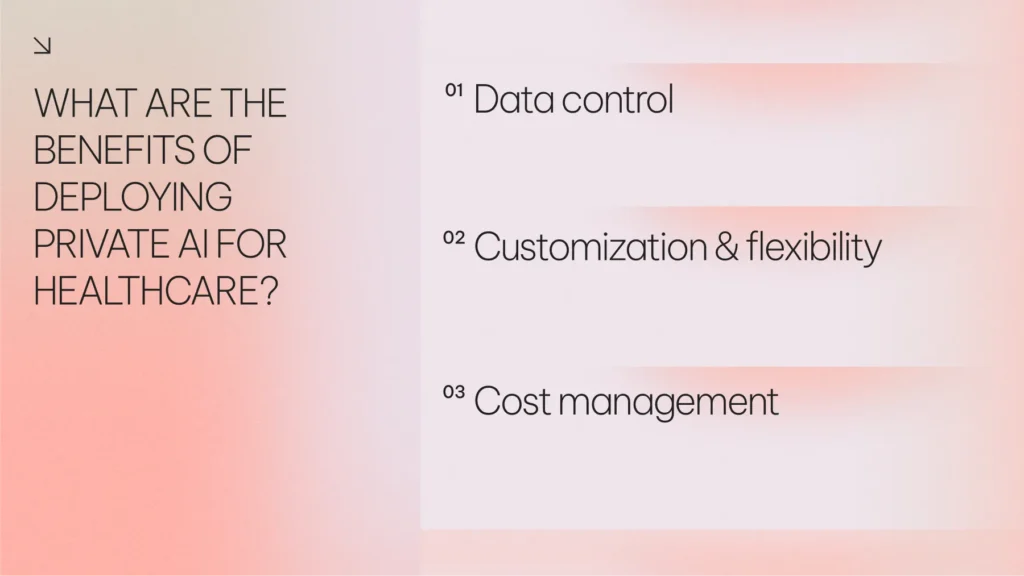
Data control
Private AI ensures that sensitive health data remains within the organization’s secure environment. Whether deployed on-premise or in a private cloud, this approach provides strict control over how data is accessed, used, and stored.
By minimizing reliance on third-party vendors, organizations reduce their risk of data breaches and improve compliance with regulations such as HIPAA and GDPR. Full data sovereignty also allows healthcare providers to keep patient data within national or regional boundaries, a critical requirement for many systems.
Private AI supports advanced redaction and anonymization techniques, enabling teams to use real-world data for analysis, training, or decision support without exposing personally identifiable information. This self-contained architecture provides healthcare leaders with the confidence to explore AI while maintaining control at every level.
Customization and flexibility
Private AI enables healthcare organizations to tailor AI models to meet their unique clinical, administrative, and operational needs. With on-premise or private cloud deployments, teams can fine-tune models for tasks such as medical summarization, diagnosis support, and patient communication, ensuring alignment with real-world workflows.
These environments also support tailored personas and prompt-based controls. This enables clinicians and staff to retrieve relevant insights securely and efficiently, based on defined access rules and governance policies.
Custom configurations can include built-in guardrails that restrict data access, ensuring only authorized personnel can view or interact with sensitive information. This level of flexibility allows private AI to integrate seamlessly across healthcare systems, whether in financial services, clinical operations, or patient engagement, while maintaining the highest standards of control and compliance.
Cost management
Private AI supports long-term cost control by streamlining operations, reducing manual workloads, and minimizing compliance risks. From automating administrative tasks to improving workflows, it delivers operational efficiency that reduces both time and staffing overhead.
Significant savings can also be achieved through automated patient communication, documentation, and education, freeing up clinical and support staff to focus on higher-value activities.
Crucially, keeping data on-premise or within a private cloud reduces the risk of data breaches, which are especially costly in the healthcare sector. By maintaining compliance and minimizing reliance on third-party vendors, Private AI allows healthcare organizations to avoid regulatory fines and reputational damage while laying the groundwork for financially sustainable innovation.
What are the challenges of deploying private AI in healthcare
While private AI offers substantial benefits for healthcare organizations, implementation comes with its own set of challenges. Below are some of the most pressing concerns.
Data privacy and compliance
Although Private AI enables greater control over sensitive data, maintaining full compliance with regulations such as HIPAA and GDPR remains complex. Healthcare organizations must safeguard patient information not only during model deployment but also during day-to-day operation.
Past failures in public-private healthcare partnerships demonstrate how easily trust can be lost when privacy standards are not met. To avoid fines and reputational damage, organizations must invest in secure infrastructure, enforce clear internal policies, and maintain ongoing monitoring to protect data at every stage of the AI lifecycle.
Balancing performance and hardware requirements
Running large-scale AI models on-premise or in a private cloud requires substantial computing power, typically in the form of high-end GPUs and resilient infrastructure. For many healthcare organizations, this means making significant investments in hardware to ensure consistent performance.
Without the right setup, model performance can degrade, limiting the effectiveness of AI solutions. Striking the right balance between model complexity, infrastructure capacity, and budget is a continuous challenge, particularly for institutions with legacy systems or limited IT resources.
Customization and technical expertise
Tailoring AI models for clinical, administrative, and operational use requires highly specialized skills. Fine-tuning models to meet healthcare-specific needs while remaining fully compliant with data protection regulations demands deep technical, regulatory, and domain knowledge.
However, many healthcare organizations face difficulty sourcing and retaining professionals with expertise in AI, data security, and infrastructure deployment. The intersection of these skill sets is rare, and success in private AI adoption often depends on building or partnering with dedicated cross-functional teams that understand both the technology and the regulatory landscape.
Best practices for deploying and scaling private AI in healthcare
Successfully implementing private AI requires more than technical infrastructure; it demands strategic alignment with healthcare priorities. Here are some considerations.
Select the right model
Healthcare leaders should start by selecting models that can be fine-tuned for specific, critical use cases. While general-purpose AI models provide a starting point, they often require significant customization to interpret clinical data and comply with healthcare regulations accurately.
By selecting adaptable models and fine-tuning them for specific tasks, such as medical summarization, triage support, or diagnostic analysis, organizations improve model performance and ensure the AI system is aligned with both clinical needs and compliance requirements.
Scalability and security
Private AI deployments must provide secure and scalable access to sensitive data. Role-based access controls are essential, allowing organizations to manage who can view or interact with patient information across departments and job functions.
This approach helps maintain HIPAA and GDPR compliance while protecting patient confidentiality at every level of the organization. Scalable security infrastructure also enables consistent performance as usage expands, ensuring long-term resilience.
Prioritise transparency
For private AI to succeed, it must integrate seamlessly into existing healthcare workflows. Embedding AI within systems such as electronic health records, billing platforms, scheduling tools, and documentation software ensures that it enhances operations without creating additional friction.
Transparent, well-governed deployments reduce user resistance, improve trust, and ensure that AI supports and does not disrupt care delivery and administrative processes. Establishing a secure, compliant environment from the outset reinforces this alignment.
Preparing for the future of enterprise AI in healthcare
Preparing for private AI in healthcare is about more than just upgrading technology. It means putting the right foundations in place, secure infrastructure, transparent governance, and teams who understand both the opportunities and the responsibilities.
Success depends on selecting tools that meet clinical needs, integrate seamlessly with existing systems, and maintain patient data protection. The benefits are tangible: faster decision-making, improved communication, and more seamless operations.
However, healthcare leaders must stay focused on trust, transparency, and long-term impact. Privacy and performance aren’t opposing goals; they must go hand in hand for any AI solution to deliver lasting value.
FAQs
-
AI is used for disease detection, medical imaging, clinical decision support, drug discovery, data processing, patient communication, administrative automation, and public health management.
-
Key concerns include data misuse, re-identification risk, lack of consent, opaque algorithms, cross-border data flow, and insufficient safeguards in public-private data partnerships.
-
Private AI processes data on-premise, ensures no external data sharing, redacts sensitive information, controls access, and supports HIPAA/GDPR compliance through secure, local deployment.a
